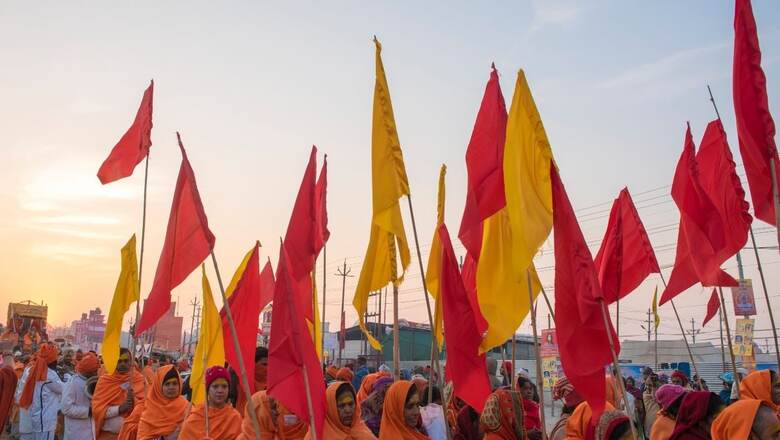
views
The current political assault on Hinduism/Sanatana Dharma from the Opposition I.N.D.I. Alliance is clouded by a misuse of terms, derogatory stereotypes and wrong translations. It descends into an abyss of denigration and demonisation of humanity’s oldest, most profound and transformative tradition of self-knowledge and cosmic knowledge, which is the enduring core of India’s civilisation.
Sanatana Dharma refers to the essence of dharma which is Sanatana, meaning perpetual and ever-renewed. Sanatana Dharma does not refer to one aspect of dharma, but generically to the unity of dharmic principles, which are the laws of life and consciousness of the self-aware universe.
A Thousand Names and More
In Hinduism, each deity/Devata has a thousand names. Such compilations are Shiva Sahasranama, Vishnu Sahasranama, Lalita Sahasranama, and the thousand names of Shiva, Vishnu and Devi. Chanting the thousand names of the deity is regarded as especially powerful. This doesn’t mean that the thousand names are for separate deities. So, Sanatana Dharma or Hinduism cannot be reduced to a single name, term or application. It has many levels, dimensions and expressions and has seen many changes in culture and language over thousands of years.
Here are a few of the synonyms for Sanatana Dharma in Sanskrit, relative to how the highest dharma is defined.
- Satya Dharma, the dharma of eternal truth, not just transient information or opinions.
- Atma Dharma, the dharma or self-realisation, reveals our true immortal nature, the divine self that dwells in the hearts of all.
- Brahma Dharma, Parabrahman, the boundless reality of sat, eternal being, chit, all-knowing consciousness, and ananda, supreme bliss.
- Moksha Dharma, which grants liberation from all death and sorrow, not just the freedom to pursue outer desires.
- Yoga Dharma, including all the paths of yoga as Jnana, Bhakti and Karma, as yoga is the traditional way of fulfilling our Moksha Dharma.
- Veda Dharma, referring to transcendent knowledge arising from the Rishi vision, with Vedanta as its prime philosophy.
- Vishva Dharma or the Universal Dharma, relevant to all living beings, all worlds and lokas from the physical to higher realms beyond name and form.
- Manava Dharma, the dharma for all human beings, not just for one community, who are all manifestations of the same Atman.
- Arya Dharma, dharma of noble and refined minds, a term also used for Buddha Dharma and Jain Dharma.
In addition to Sanskrit, Sanatana Dharma has different names in various languages in India and throughout the world, including the commonly known terms of Hinduism and Hindu Dharma.
Semantic Reductionism
Modern Western languages, notably English, lack the linguistic diversity and multileveled meanings as Sanskrit. They suffer from what I would call ‘semantic reductionism’, which is reducing something to one name or term as a final judgement.
Western scholars insist that what is not verbally called Hinduism in a text cannot be regarded as Hinduism because the word ‘Hinduism’ is not there. This means Hinduism cannot be called Sanatana Dharma, Yoga, Vedanta or any of the traditions that are part of it because of differences in name, though the content and practices are the same. We also find such narrow thinking in the reduction of Hinduism to literal worship of cows, and caste as its view of society, ignoring its cosmic vision, Yoga and Vedanta.
Political Reductionism
This reductionism easily gives way to stereotypes, dualistic thinking and name-calling. Today, Indian leaders who are proud of being Hindus, including Prime Minister Narendra Modi, are subject to this denigration by calling them far right, intolerant Hindu nationalists, or even fascists.
The term fascist, which originally referred to Italian Catholic nationalists following Mussolini, has become a way of demonising anyone who doesn’t agree with you. It can be used to justify depriving those who disagree with you of their human rights or even destroying them. Such reductionist terms are like the Middle Ages when people were called Satanic or children of the Devil, which caused witch-burning and numerous religious wars.
India’s Opposition alliance today has gone so far as trying to discredit any news anchor who disagrees with them, denouncing them as biased, communal or fascist, whose voice should not be heard and programs not seen or attended. If they can aim to suppress freedom of expression when in the opposition, they would likely create a dictatorship if they come into power.
Sanatana Dharma Will Prevail
Sanatana Dharma and its universal teachings tower above reductionist political ideologies left or right, their narrow opinions, self-promoting political agendas, and propagandistic media toolkits. It offers a transformative aspiration to humanity that those trapped in the body, senses and the material world cannot appreciate.
Those who think they can eradicate Sanatana Dharma should just as well try to eradicate the Himalayas. Sanatana Dharma is the teaching of the Himalayan Yogis and Rishis since the dawn of history, taking us to the Eternal and the Infinite. It is rooted in the mountains, waters, nature and the Earth itself.
Certainly, there have been misapplications of Sanatana Dharma over time and constant adaptation is necessary to sustain such a vast tradition from human inertia. But since Swami Vivekananda and the Indian independence movement, and after centuries of suppression under foreign rule, Sanatana Dharma and its dharmic traditions has gone global, is renewing India, and can help us embrace the whole of life as a single family. Let us look at what Sanatana Dharma truly means in its many dimensions, not simply according to the political expediency of adharmic forces.
The writer is the director of the American Institute of Vedic Studies and the author of more than 30 books on yoga and Vedic traditions. Views expressed in the above piece are personal and solely that of the author. They do not necessarily reflect News18’s views.




















Comments
0 comment